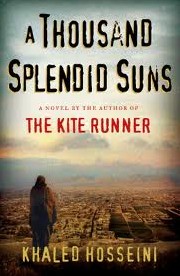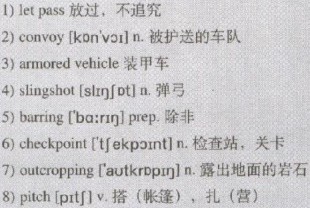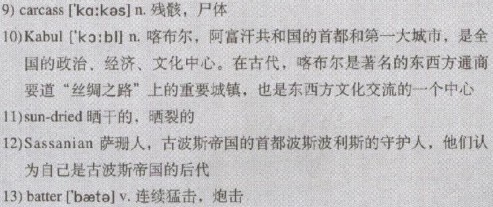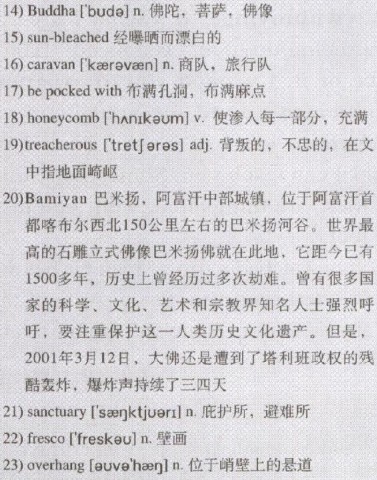私生女玛丽雅姆的童年在十五岁生日时一去不复返:母亲自杀,定期探访的父亲也仿成陌路。她成为了喀布尔中年鞋匠拉希德的妻子,生活在动荡年代的家庭暴力阴影下。十八年后,战乱仍未平息,少女莱拉失去了父母与恋人,亦被迫嫁给拉希德……
关于不可宽恕的时代,不可能的友谊以及不可毁灭的爱,《灿烂千阳》再次以阿富汗战乱为背景,时空跨越三十年,用细腻感人的笔触描绘了阿富汗旧家族制度下苦苦挣扎的妇女,她们所怀抱的希望、爱情、梦想与所有的失落。
本文节选自《灿烂千阳》的一个片段,描述的是莱拉和父亲以及年少时的恋人塔里克一起出游时在阿富汗乡间的所见所闻。
文字难度:★★★☆
中英文完整版下载地址:http://www.joyen.net/soft/endown/read/201103/175.html
The driver pulled his taxi over to 1)let pass another long 2)convoy of Soviet jeeps and 3)armored vehicles. Tariq leaned across the front seat, over the driver, and yelled, “Pajalmia! Pajalmia!”
司机将出租车停在路边,好让另外一大队苏联吉普和装甲车通过。坐在前排的塔里克向司机那边靠过去,趴在他身上,用俄语大声向车窗外喊道:“请啊!请啊!”
A jeep honked and Tariq whistled back, beaming and waving cheerfully. “Lovely guns!” he yelled. “Fabulous jeeps! Fabulous army! Too bad you’re losing to a bunch of peasants firing 4)slingshots!” The convoy passed. The driver merged back onto the road.
有一辆吉普响了响喇叭,塔里克报以一声口哨,容光焕发的他高兴地挥动着手臂。“多漂亮的枪啊!”他高声说,“多么棒的吉普啊!多了不起的军队啊!可惜你们连一群拿着弹弓的农民都打不过!”车队已经开过去,司机开动汽车重新上路了。
“How much farther?” Laila asked. “An hour at the most,” the driver said. “5)Barring any more convoys or 6)checkpoints.”
“还有多远啊?”莱拉问。“顶多一个小时。”司机说,“如果没有更多的车队和关卡的话。”
 They were taking a day trip, Laila, Babi, and Tariq. The trip was Babi’s idea. Though he could hardly afford it on his salary, he’d hired a driver for the day. He wouldn’t disclose anything to Laila about their destination except to say that, with it, he was contributing to her education.
They were taking a day trip, Laila, Babi, and Tariq. The trip was Babi’s idea. Though he could hardly afford it on his salary, he’d hired a driver for the day. He wouldn’t disclose anything to Laila about their destination except to say that, with it, he was contributing to her education.
他们——莱拉,爸爸和塔里克——在这一天外出游玩,这是莱拉爸爸的提议。尽管他的薪水几乎无法承担他们游玩的费用,但他还是在这一天请了个司机。至于他们要去哪里,爸爸半点都没跟莱拉透露,只说要去的那个地方很有教育意义。
They had been on the road since five in the morning. Through Laila’s window, the landscape shifted from snowcapped peaks to deserts to canyons and sun-scorched 7)outcroppings of rocks. Along the way, they passed mud houses with thatched roofs and fields dotted with bundles of wheat. 8)Pitched out in the dusty fields, here and there, Laila recognized the black tents of Koochi nomads. And, frequently, the 9)carcasses of burnedout Soviet tanks and wrecked helicopters. This, she thought, here in the provinces, was where the war was being fought, after all. Not in 10)Kabul. Kabul was largely at peace. Back in Kabul, if not for the occasional bursts of gunfire, if not for the Soviet soldiers smoking on the sidewalks and the Soviet jeeps always bumping through the streets, war might as well have been a rumor.
那天早上,他们五点就上路了。莱拉坐在窗边,看着车外的景色从被白雪覆盖的山峰渐变成沙漠、峡谷,再变成被太阳烤得干裂的、盘踞在地面上的大岩石。一路上,他们经过一些用茅草搭成屋顶的泥屋和散落着一捆捆小麦的田地。莱拉还能见到游牧部落的黑色帐篷,星星点点地安扎在尘土飞扬的土地上。更为常见的是被烧毁的苏联坦克和坠毁的直升飞机的残骸。她心里想,原来真的发生过一场战争,就在这儿,在这些乡下地方。喀布尔没有战争,那里大体上平安无事。在喀布尔,如果不是那些时不时爆发的枪声,如果不是人行道上总是有苏联的士兵在吸烟,街道上总是能见到苏联的吉普车颠簸着前进,战争可能也只是一段传闻而已。
It was late morning, after they’d passed two more checkpoints, when they entered a valley. Babi had Laila lean across the seat and pointed to a series of ancient-looking walls of 11)sun-dried red in the distance. “That’s called Red City. It used to be a fortress. It was built some nine hundred years ago to defend the valley from invaders.”
他们又通过两个关卡,来到一座峡谷,这时已经临近中午了。爸爸让莱拉从座位上趴过来,指着远处几堵看上去年代久远且干裂的红砖墙。“那个叫红城,原来是一座堡垒。它建于九百年前,用来保护峡谷免遭外来的入侵者。”
“And that, my young friends, is the story of our country, one invader after another,” the driver said, flicking cigarette ash out the window. “Macedonians. 12)Sassanians. Arabs. Mongols. Now the Soviets. But we’re like those walls up there. 13)Battered, and nothing pretty to look at, but still standing. Isn’t that the truth, badar?’
“两位小朋友,这就是我们国家的历史,源源不断的入侵者。”司机把烟灰弹出窗外,接着说,“马其顿人、萨珊人、阿拉伯人、蒙古人,现在是苏联人。不过我们就像那边耸立的城墙,伤痕累累,看上去一点都不漂亮,但仍然屹立着。我说的没错吧,老兄?”
“Indeed it is,” said Babi.
“确实没错。”爸爸说。
Half an hour later, the driver pulled over.
半个小时后,司机把车停了下来。
“Come on, you two,” Babi said. “Come outside and have a look.” They got out of the taxi. Babi pointed “There they are. Look.” Tariq gasped. Laila did too. And she knew then that she could live to be a hundred and she would never again see a thing as magnificent.
“下来吧,你们两个,”爸爸说,“到外面来看看。”他们下了车,爸爸指向远处,“在那边,快看。”塔里克张大了嘴巴,莱拉也一样。当时她觉得自己就算再活一百岁,也不可能再看到这么壮观的景象了。
The two 14)Buddhas were enormous, soaring much higher than she had imagined from all the photos she’d seen of them. Chiseled into a 15)sun-bleached rock cliff, they peered down at them, as they had nearly two thousand years before, Laila imagined, at 16)caravans crossing the valley on the Silk Road. On either side of them, along the overhanging niche, the cliff 17)was pocked with myriad caves.
她之前见过这两尊大佛的图片,但它们极其庞大,高高耸起,规模之宏伟远远超出她先前的想象。大佛是在一片被阳光晒得发白的石壁上被开凿出来的,居高临下地俯视着他们。莱拉想象将近两千年之前,它们也是这样俯瞰着途经这座位于丝绸之路上的峡谷的商旅。两尊大佛的两旁,沿着突出来的神龛的峭壁上还有无数个洞穴。
“I feel so small,” Tariq said. “You want to climb up?” Babi said. “Up the statues?” Laila asked. “We can do that?”
“我觉得自己很渺小。”塔里克说。“你们想爬上去吗?”爸爸说。“爬上那两尊佛像?”莱拉问,“我们可以爬上去吗?”
Babi smiled and held out his hand. “Come on.”
爸爸笑了起来,伸出他的手,“走吧。”
They saw shadowy caves along the way, and tunnels 18)honeycombing the cliff every which way. “Careful where you step,” Babi said. His voice made a loud echo. “The ground is 19)treache-rous.” In some parts, the staircase was open to the Buddha’s cavity. “Don’t look down, children. Keep looking straight ahead.”
一路上,他们看到很多阴影幢幢的洞穴,还有向四面八方延伸的隧道,蜂巢似的分布在峭壁上。“当心你们的脚下,”爸爸说,他的声音产生了巨大的回声,“路不好走。” 在有些地方,这条楼梯通向大佛藏身的洞穴。“别往下看,孩子们,一直往前看就好了。”
As they climbed, Babi told them that 20)Bamiyan had once been a thriving Buddhist center until it had fallen under Islamic Arab rule in the ninth century. The sandstone cliffs were home to Buddhist monks who carved caves in them to use as living quarters and as 21)sanctuary for weary traveling pilgrims. The monks, Babi said, painted beautiful 22)frescoes along the walls and roofs of their caves.
向上爬的时候,爸爸告诉他们,巴米扬曾经是昌盛繁荣的佛教中心,后来在九世纪的时候,它落进了信奉伊斯兰教的阿拉伯人的手里。这儿的砂岩峭壁过去是很多僧侣的家园,他们在峭壁上凿开洞穴,当成自己的住所,也供过往疲惫的香客暂住。爸爸说,这些僧侣在洞穴的墙壁和洞顶上绘制了很多美丽的壁画。
Tariq was badly out of breath when they reached the top. Babi was panting too. But his eyes shone with excitement. “We’re standing atop its head,” he said, wiping his brow with a handkerchief. “There’s a niche over here where we can look out.”
他们登到顶的时候,塔里克几乎喘不过来气来。爸爸也是气喘吁吁,但他的眼里闪烁着兴奋的光芒。“我们正站在它的头顶,”他边说,边用手帕擦额头。“那边有一个神龛,我们可以站在那里望。”
They inched over to the craggy 23)overhang and, standing side by side, with Babi in the middle, gazed down on the valley. “Look at this!” said Laila. Babi smiled.
他们沿着那条崎岖的悬道走过去,并排站着,爸爸在中间,俯视着下方的峡谷。“快看这个!”莱拉说。爸爸笑了起来。
The Bamiyan Valley below was carpeted by lush farming fields. Babi said they were green winter wheat and 24)alfalfa, potatoes too. The fields were bordered by 25)poplars and crisscrossed by streams and irrigation ditches, on the banks of which tiny female figures squatted and washed clothes. It was autumn, and Laila could make out people in bright 26)tunics on the roofs of mud brick dwellings laying out the harvest to dry. The sky above all of this was an immaculate, spotless blue. “It’s so quiet,” Laila breathed. She could see tiny sheep and horses but couldn’t hear their 27)bleating and 28)whinnying. “It’s what I always remember about being up here,” Babi said. “The silence. The peace of it. I wanted you to experience it. But I also wanted you to see your country’s heritage, children, to learn of its rich past. You see, some things I can teach you. Some you learn from books. But there are things that, well, you just have to see and feel.”
下方的巴米扬峡谷遍布着长势繁茂的农田。爸爸说它们是绿色的冬小麦和紫花苜蓿,也有一些是土豆。田地四周是高耸的白杨树,中间纵横交错的是溪流和用于灌溉的沟渠,几个细小的女性蹲在岸边洗衣服。已是入秋时节,莱拉能看见一些人穿着颜色鲜艳的束腰外衣,站在泥砖屋的屋顶上晾晒谷物。所有这一切上方,是一碧如洗、幽蓝如渊的天空。“真安静。”莱拉吸了一口气。她看得见细小的绵羊和马匹,但听不到它们的咩咩声和嘶叫声。“在我的记忆中,这里一直都是这样的,”爸爸说,“寂静,祥和。孩子们,我想让你们来感受一番,我也希望你们来看看祖国的遗产,来了解它丰富的历史。你们知道的,有些东西我可以教你们,有些东西你们可以从书本上学到。但有些东西,怎么说呢,得你们自己去见识和体会。”
Laila watched a trio of men far below, talking near a cow 29)tethered to a fence. Around them, the trees had started to turn, ochre and orange, scarlet red.
莱拉看到下面远远的地方有三个男人,在一头系在篱笆上的耕牛旁边聊天。他们身边的树已经开始换颜色了,满是一片赭色,鲜黄和猩红的色彩。





编后语:
胡塞尼此书的书名来自波斯诗人塞依伯歌颂喀布尔的诗歌:“人们数不清她的屋顶上有多少皎洁的明月,也数不清她的墙壁之后那一千个灿烂的太阳。”(One could not count the moons that shimmer on her roofs. And the thousand splendid suns that hide behind her walls.)书中女主人公莱拉的爸爸,刚吟完这首诗就被炸得身首分离。当时他正在整理书架,为难地想如何从满架的书中挑出五本来带到美国去。
很长一段时间内,世界上很多关于阿富汗人的文章多数围绕塔利班、本 • 拉登和反恐战争展开。电视新闻画面里血肉模糊、炸弹横飞的场面也很难让人想象那些和我们比邻而居的人们过着一种怎样的生活。胡塞尼的两本小说为全球读者展开了阿富汗文化民俗和历史的长卷,就好像擦亮了一扇窗户,那个国家不再只是灰色……(Eva)
 作者简介:
作者简介:
卡勒德·胡塞尼(Khaled Hosseini),1965年生于喀布尔,后随父亲逃往美国。胡塞尼毕业于加州大学圣地亚哥医学系,现居加州,并因其巨大的国际影响力受邀担任联合国亲善大使。他的第一本小说《追风筝的人》(The Kite Runner)问世后大获成功,因书中角色刻画生动,故事情节震撼感人,蝉联亚马逊排行榜131周之久,全球热销600万册,创下出版奇迹。《灿烂千阳》是胡塞尼继《追风筝的人》四年后出版的第二本小说,出版之前即获得极大关注,2007年5月22日在美国首发,赢得评论界一致好评,使胡塞尼由新人作家一跃成为受到广泛认可的成熟作家。
